- Home
- Ian McDonald
Moon Rising Page 35
Moon Rising Read online
Page 35
Family first. Family always.
The words of the betraying are handwritten, archaic marks on expensive paper.
Words like musical notes, the work of her fingers.
Robson crumples the note. He would throw it across the aparment – an affront to perfection of the zabbaleen – but for all her betrayal, she should not be left lying for strangers to find.
Bryce Mackenzie is dead. Robson is safe. Now he can close the door behind him, go on the BALTRAN and return to his family and city.
TWENTY-THREE
I’m not a fighter, he says in the rover from the BALTRAN terminal.
I’m a wolf, he says as the rovers roll down into João de Deus Lock 4.
I’m not really a Corta, he says as the guillotine gates of the outlock close and the pressure equalises.
You’re a Corta, they say and put a knife in his right hand and a knife in his left hand.
I’m not a leader, he says as the inlock opens. I’m not the Iron Hand.
You lead, says the Iron Hand. This is your fight.
And I’ve got you, Nelson Medeiros whispers at Wagner’s shoulder. You’ll just get yourself stupidly killed.
Then the wolf breathes deep of the reek and perfume of João de Deus and with a cry he leads the escoltas on to Kondakova Prospekt. The liberation of João de Deus is fast and overwhelming. Rover-borne Corta squads seize the city’s surface locks; mercenaries arrive from Twé on a chartered train. Pods of materiel drop into the electromagnetic hands of the BALTRAN relay; VTO track-queens on day-hire contracts feed it to the assault teams down on the prospekts. But there is no battle here. João de Deus has liberated itself. Lucas’s dusters and sleeper agents inside Mackenzie Helium moved to secure the city’s air, power and water. Santinhos left their work and schools and homes and mobbed the public printers to print up knives and body armour. João de Deus rose: Mackenzie Helium blades sheathed their knives. There is no profit in pointless death. The board fled at the first rumour that Bryce Mackenzie was dead at the hands of a Corta; senior management turned in their resignations and quit their offices.
Kondakova Prospekt is filled wall to wall with escoltas, dusters, Santinhos. Cheers and whistles and applause snow down from the levels and crosswalks as Wagner leads the liberating army. More join every minute. By the time he reaches the smashed doors of Mackenzie Helium’s headquarters all of João de Deus is behind him. He raises a hand. The army halts. The voices fall silent. The neon MH sign flickers on the edge of death, most of its tubes taken out by slingshots and quick-printed stonebows.
Through the broken doors come two figures: a blade and a boy. The woman still shelters Robson under her arm. He is bruised, blood-stained, broken. The woman whispers to him. He looks up. Light fills his eyes.
The blades fall from Wagner’s hands. He runs to Robson and scoops the skinny, wrecked boy up in his arms.
‘Oh you,’ he gasps. Tears stream down his face. ‘Oh you you you.’
João de Deus answers with a shout.
Revolution is so untidy. He walks through the detritus of the liberation: water bottles, knives, pieces of door frames and window surrounds for clubs; chunks of hacked-loose sinter for missiles. Placards. Items of clothing. A shoe. Two bodies. Lucas regrets those. He had intended this to be a bloodless acquisition. Bloodless, save for those whose blood had to be shed. Ahead he can still hear the singing and chanting of the crowd. An ugly town, João de Deus. He never recognised its ugliness when he lived here. The eye of the conqueror sees the cost of the conquest.
Conqueror. Salve Lucas Imperator. Lucas smiles at his presumption. He kicks a lump of stone up the prospekt. The roar of the crowd is closer, louder, rising and falling in waves. The wolf knows how to work a crowd. The bastard did well. Mustn’t let the people love him too much. After the reconstruction, after the zabbaleen have crept out of their digs and tunnels to clear away the wreckage, he must rotate Wagner back to Meridian. Some role in the civil service. Not too demanding. Plenty of time to fuck his wolf friends.
The kid: when it came to it, he had the Iron Hand.
Lucas isn’t sure he could have done what Robson Corta did.
Toquinho is ready at the edge of Lucas’s consciousness with a highlight, but Lucas does not need the hint. He knows where and when to look up. The empty windows, the smoke-blackened walls, the caved-in doors have no power any more. The best sound room in the two worlds. He made Jorge unpack his guitar in the living room so that the shape of the case would not affect the sonic landscape. Gone. He won’t rebuild it. Pointless to live in a museum. Boa Vista is his home now and he will rebuild this mean city as it should have been; tough, energetic, chaotic, celebratory. And do something – something – about the João de Deus reek.
Denny Mackenzie hung Carlinhos by his heels from this bridge. Slung a cable through his Achilles tendons. Blood from his throat ran down his arms and dripped from his fingers to the paving: here. They said he fought like a demon; killed twenty Mackenzie blades before Denny took him down and cut his throat through to the bone. As Alexia pointed out, that same Denny Mackenzie Lucas helped install in Hadley.
The old moon is dead. It died at his first meeting with the financiers, the government representatives, the military advisers, down on the hell of Earth. The new moon is not yet born. The piece is not played through.
Duncan and Bryce Mackenzie are dead. Denny Mackenzie is the flash and dash of the old, buccaneering spirit of Robert Mackenzie while quietly competent women build a new Mackenzie Metals. The Vorontsovs reach for the worlds beyond. The Suns are humiliated, yet prepare for all-out economic war with their ancient enemies on Earth. The university stirs from its long sleep. The Asamoahs: who knows what they plan and scheme? And the Cortas? The Helium Age is over. Corta Hélio will not return.
It was never about Corta Hélio.
‘Family first,’ Lucas says. ‘Family always.’ In the corner of his eye, a new thing, strange to his memory of João de Deus. He walks to the wall of shuttering over the old Boa Vista tram station. A shrine to the Sisters who sacrificed themselves to free Lucasinho from the hands of Bryce Mackenzie. More: to the Cortas. To his family. The golden triangle. Rafa. Honest, straight Carlinhos. Lucas never told his younger brother, but he always admired Carlinhos. Carlinhos knew what had to be done and did it. No doubt, no question. In the centre, his mother. The image is from the old wild-catting days, when Lucas was the strangely silent, frowning baby in the berçario.
‘Mamãe.’
One portrait missing. Of course. The whole moon saw him as the traitor when he threw Jonathon Kayode down from his Eyrie and took the high seat of the Eagle of the Moon. Lucas crouches, brushes dust from his pants, picks up his image. So solemn, so serious. He presses it against the wall until the adhesive fixers bind. He tips his hat forward.
‘Well, I’m back,’ he says.
Two shell-suits, one blue and white, one pink and purple. The suits stand on an elevator platform, holding hands. The elevator climbs slowly up the airless shaft of Coriolis’s West Rim lock.
Blue and white are the colours of the University of Farside. Pink and purple are the colours that Lucasinho Corta picked out of the row in the lock’s suit-room.
‘Are you okay about this?’ Luna Corta said as the haptic rig enclosed Lucasinho in its silken web.
‘It tickles,’ Lucasinho said.
‘Only for a minute,’ Luna said. She was an old hand at the haptic rig, at the whole shell-suit thing now. A true duster. ‘If you feel weird, we can stop.’
‘I don’t want to stop,’ Lucasinho said. His face twitched. Still the spasms and tics as the protein chips forge new pathways in his brain. ‘Luna, if I do …’
‘I’ll be right there.’
He looked nervous as the suit began to seal up around him; legs, hips, torso. Arms, shoulder: he gave a small cry as the helmet folded around him.
/> ‘You all right?’ Luna asked on the common channel. Lucasinho’s right glove formed an ‘O’ with thumb and forefinger: the ancient pressure-suit sign that everything was all right. But on the far side of the lock, on the elevator platform, he took a clunking step closer to Luna and held out a hand. She took his armoured gauntlet in hers. Shell-suits are all the same size; it is the bodies and hearts inside that differ.
The elevator climbs, the two suits emerge into the surface clutter and debris of Coriolis’s crater-rim.
‘On top of the world!’ Luna says as the platform stops and locks. The view is stupendous, far far over the too-close horizon, across an endless panoply of craters, craters within craters, rilles and broken rim-walls, strongly shadowed in the light of a sun halfway to the zenith. Beyond, on the far edge of seeing, the mountains of Farside.
‘You okay?’ Luna asks. She squeezes Lucasinho’s hand. The haptics will turn it into reassurance.
‘I’m okay.’
‘Let’s try a walk,’ Luna says. She leads Lucasinho a few paces off the elevator on to the rim. The crater-top is an undulating upland curving almost imperceptibly on either side of them. Comms dishes occupy the higher summits. The shadow of the eastern rim lies long across the crater floor: Luna points out Equatorial One, the station, the magic-box glimmer of the cable-cars spinning down from Coriolis’s campuses and districts. Lucasinho is spellbound. Luna squeezes his hand again.
‘Look up.’
‘Up?’
‘Look up.’
She sees his helmet tilt back. There is a long silence, then a longer, amazed, sighing breath.
‘Nothing but stars!’
From Rozhdestvenskiy to Schrodinger, from Mare Orientale to Mare Smythii, in the biology labs of Mandelshtam and the antennae arrays of Muscoviense, Farside is in uproar. A muted, unrushed, considered uproar, but Ariel has dwelt in the halls of the university long enough to read the upswing in conference calls, the bustle of senior academics and facultarians through Farside train stations, the recall and dispatch of ghazis. A political impacter of world-breaking mass has struck Nearside and the moon is ringing like a terreiro bell. A seism greater even than the War of Mackenzie Succession.
She likes that term. She might have Beija Flor flick it over to the history faculty at Mare Ingenii.
Vidhya Rao, Beija Flor announces.
‘Fuck.’
State-of-the-planet surveys are best taken from the perspective of one’s own bed. Ariel swings out from beneath the sheet and summons clothes.
Vidhya Rao has now been waiting for ten minutes, Beija Flor announces as Ariel dresses.
‘Face first,’ Ariel says.
By the time she is dressed and faced, she knows exactly what has hit the world.
‘Clever, clever boy,’ she whispers as she adjusts the sit of her hat.
‘Did your August Sages foresee that one?’ Ariel asks as she sweeps into her drawing room.
‘I no longer have access to the Three August Sages,’ Vidhya Rao says. ‘Lunar politics has entered a critical stage.’
‘Most people would look at it as a robust change of management.’
‘The Eagle of the Moon is independent, impartial and does not involve themself in corporate politics.’
‘Jonathon Kayode was an enthusiastic meddler in corporate politics. He was married to a Mackenzie, for gods’ sake.’
‘There is a difference between dropping hints and slipping information, and assassinating your rival and taking his corporate headquarters.’
‘“Slipped information” about the Mare Anguis licence sparked the Corta-Mackenzie war,’ Ariel says.
‘He also suggested the Corta-Mackenzie marriage to end the bloodshed.’
‘Knowing full well that it would never happen. Knowing full well that the repercussions would lead to war. Your point?’
‘It’s started. What I saw. Those futures, with the cities full of skulls; they begin with the death of Bryce Mackenzie and Lucas paralysed politically by the LMA. He has been ordered to refuse the Vorontsovs’ Moonport proposal. He will side for the terrestrials against the Dragons. He will sanction the Lunar Bourse proposal and the genocide as the terrestrials rationalise the market.’
‘Vidhya. I ask this every time you wedge yourself into my life. Why are you here?’
‘To ask you to stop him. Because you’re the only one who can. He needs to step away from the Eyrie, but he can’t because the terrestrials will seize power. He needs an heir he can trust, Ariel.’
‘Leave me,’ Ariel orders. ‘Go.’ The sudden verbal aggression rocks Vidhya Rao. Never seen this before, have you? Never considered I could be anything other than composed, calculating, courtroom. But it’s in me, it always has been in me, years deep, like geology. The layers warp, the stresses build. The surface cracks. Marina saw this me. Abena saw this me. Now you see it. ‘Enough of your shit. Enough. My family are not your dolls to push around your playhouse. Out!’
Gods she would love a martini. Good and pure and the most marvellous thing in the universe. Outside the slit window, the gondolas swing up and down their cables. Carnival lights, festive lives. She should apologise to Vidhya Rao. She will apologise to Vidhya Rao. Not yet. Let er suffer in er sanctimony for a little longer. E was right. Ariel has always known that the final battle would be between her and Lucas. Sister and brother. Two reefs of human wreckage, ruined by family.
‘Lime spritzer,’ she orders Beija Flor. ‘In a martini glass.’ It looks good in her hand. It feels good, right. Here is clarity and precision. She has known what she must do for a long time. Now she has the idea of how to do it. She looks out over the Coriolis crater and sips from her martini glass and ideas flow to her.
It is insane. Only insanity will work now.
‘Beija Flor, get me Dakota Kaur Mackenzie.’
The ghazi is on Ariel’s lens in a heartbeat.
‘What can I do for you?’
Ariel smiles.
‘Issue a challenge.’
A subtle shift in the air conditioning. A door is open.
‘Luna?’
‘Tia.’
‘Come on in, anjinho.’
‘I heard you shouting.’
‘Were you spying?’
A pause. A small yes.
‘Do you have tunnels everywhere?’
‘Yes.’
The girl is at her side. Ariel runs fingers through Luna’s hair.
‘I thought you were going to clean that stuff off your face when Lucasinho was safe.’
‘He’s not safe yet.’
Ariel laughs small.
‘True. But he will be. Very soon.’
The girl parts the curtain of streamers and leads the ghazi by the hand into the carnival. The musics of a dozen sound systems assail them: old school samba from the station plaza faces off funk from the First Street Bridge; deep bass shouts bravado across the prospket to the impudent house foro on Second East; neo-Tropicalia blasts horn stabs from a pulpit at the Primeiro Serviço intersection while a waggon pushed by devotees blowing handball whistles circles it, laying down a bombardment of baile. Everywhere: the drums the drums the drums. Hand in hand girl and ghazi flit through rhythm and beats: they slip between the marching ranks of a batteria of drummers, close as the stick to the drumskin, completely unseen. Where music plays, humans dance. João de Deus is a working town, not a dancing town: all the better to party. It dances with delight and without inhibition. To each music its dancers. The smash and crush of bodies in booty-shorts and glitter around the baile-funk systems; old-school samba squads in body-paint and feathers and the stuttering hip-flick of the marching dance. The sweet sway of couples to the syncopations of bossa and jazz Brasiliera. The stomp and sashay of the batterias. Sweat and perfume. Hair flying; legs wide, feet planted. Shaking it, shaking it. Eyes wide, pupils dilated, tongu
es protruding; bodies leaning in, taking the rhythm of each other, swaying back and forth. Almost but never touching. Through them all ghost the girl and ghazi. The prospekt is ankle deep in paper streamers, street-food wrappers and discarded cocktail glasses. The girl kicks them away, kicks through.
And the voices the voices the voices. Shouting over the beats, shouting into each other’s faces, laughing, yelling. The girl cannot make herself heard to the ghazi: they communicate by flickers of familiar-to-familiar traffic, by look and touch and intent.
Inflatable icons of João’s heroes bob over the heads of the revellers: handball stars, musicians, telenovela actors, dustbike racers, gupshup channel celebrities; legends of old Earth: Ayrton Senna, Capita Brasil with his fists on his hips, Pele, Maria Funk Fujiwara, one-legged Saci Perere with his hat and pipe. The orixas: fierce Xango, gracious Yemenja. More than any of the others, there is an armoured fist, clenched. The Iron Hand. A Capita Brasil breaks loose, unmoored by children. It wallows up to the sunline to join the cumulus of escaped balloons. Up on the Level Four crosswalk kids open up on it with slingshots.
The girl halts as a dragon loops its coils around Third Bridge, swoops, hovers a moment before her, eyes glowing, daring her to pass, then arcs up and away, sweeping its hundred-metre length past her. It glowers at her from the top of the city, then undulates down the prospekt.
And the food! Oh, the food! The city’s hotshops have taken in their tables and seating – this is carnival! – and rattle twenty cuisines over their counters. Here are tacos, there noodle boxes. Dumplings and salads. Soup for those as must; doces and baklavas, flatbreads and tofu kofta. The biggest crowds are around the churrascarias. Smoke plumes from their electric grills filling the air with the illicit perfume of danger and burning flesh. There is meat here. Real meat!
The girl’s step falters – she last ate half a world away, and she loves the doces. The ghazi squeezes her hand and she remembers: she is on a mission. They press on, towards the great knot of bodies and lights at the heart of the carnival

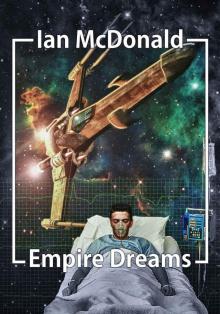 Empire Dreams
Empire Dreams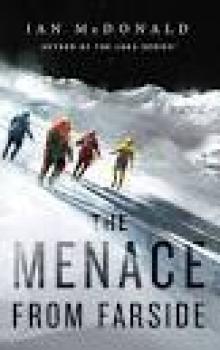 The Menace from Farside
The Menace from Farside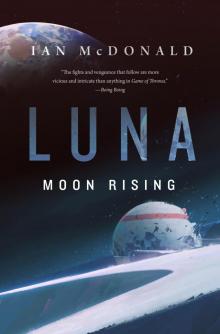 Luna: Moon Rising
Luna: Moon Rising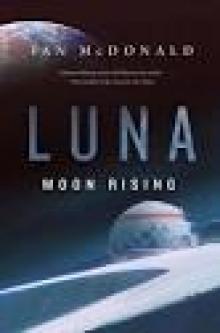 Moon Rising
Moon Rising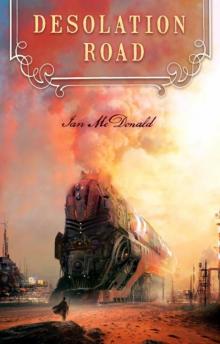 Desolation Road dru-1
Desolation Road dru-1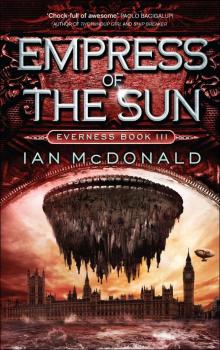 Empress of the Sun
Empress of the Sun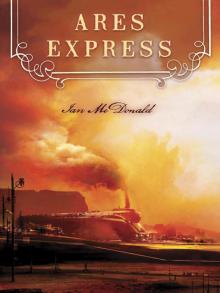 Ares Express dru-2
Ares Express dru-2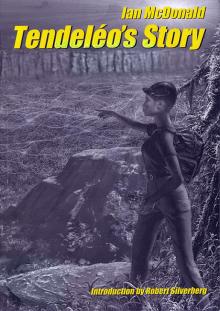 Tendeléo’s Story
Tendeléo’s Story River Of Gods
River Of Gods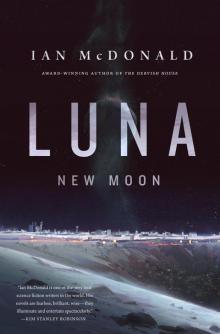 Luna
Luna![Cyberabad Days - [River of Gods 02] Read online](http://i1.bookreadfree.com/i1/03/29/cyberabad_days_-_river_of_gods_02_preview.jpg) Cyberabad Days - [River of Gods 02]
Cyberabad Days - [River of Gods 02]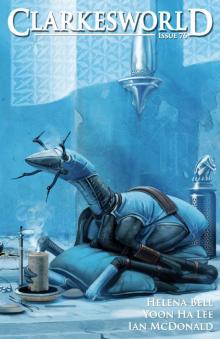 Clarkesworld Magazine Issue 76
Clarkesworld Magazine Issue 76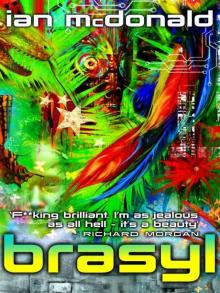 Brasyl (GollanczF.)
Brasyl (GollanczF.)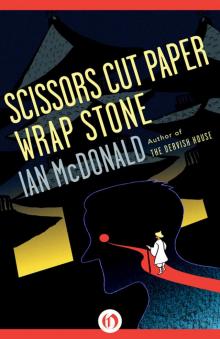 Scissors Cut Paper Wrap Stone
Scissors Cut Paper Wrap Stone Chaga
Chaga Time Was
Time Was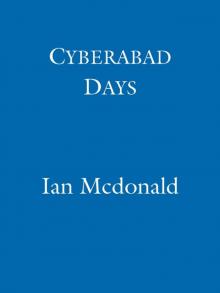 Cyberabad Days
Cyberabad Days Be My Enemy
Be My Enemy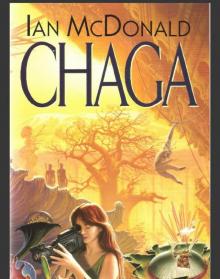 Changa
Changa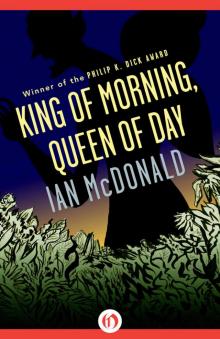 King of Morning, Queen of Day
King of Morning, Queen of Day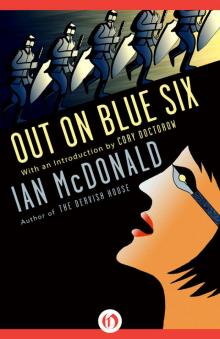 Out on Blue Six
Out on Blue Six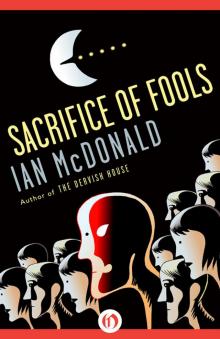 Sacrifice of Fools
Sacrifice of Fools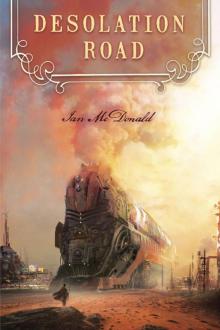 Desolation Road
Desolation Road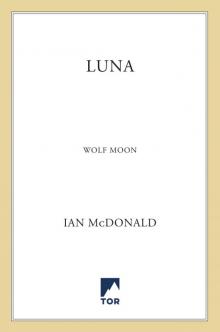 Luna--Wolf Moon--A Novel
Luna--Wolf Moon--A Novel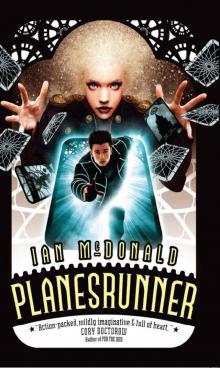 Planesrunner (Everness Book One)
Planesrunner (Everness Book One)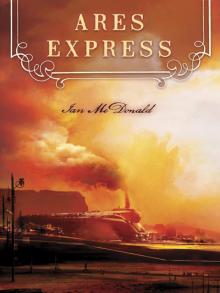 Ares Express
Ares Express